What some people do not realise is that Elizabeth I was a very accomplished writer, something which could be attributed to her Humanist education but which was also a real gift. One of my favourite books is “Elizabeth I: Collected Works” which contains all of the letters, poems, prayers and speeches that Elizabeth wrote during her lifetime. It is an amazing collection and something that I love dipping into as it gives you a real glimpse into Elizabeth’s mind and a wonderful picture of the woman she was.
Today, I want to share with you the first two poems which are attributed to Elizabeth, written while she was at house arrest during the reign of her half-sister, Mary I, at Woodstock in Oxfordshire.
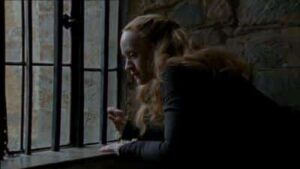
Poem 1
O Fortune, thy wresting, wavering state
Hath fraught with cares my troubled wit,
Whose witness this present prison late
Could bear, where once was joy flown quite.
Thou caused the guilty to be loosed.
This poem dates from 1554-55 and was found written in charcoal on a wall, shutter or window frame (depending on which source you believe) and copied down 40 years later. Leah S. Marcus, Janel Mueller and Mary Beth Rose, editors of “Elizabeth I: Collected Works”, point out that it was common practice in the 16th century to write messages, poems and proverbs on walls and shutters.
Poem 2
Much suspected by me,
Nothing proved can be.Quod Elizabeth the Prisoner
John Foxe, in his book “Actes and Monuments” (Foxe’s Book of Martyrs) writes that “When Elizabeth quitted Woodstock, she left the following lines written with her diamond on the window” and then cites the poem exactly as it is written above. The same wording is also recorded by Holinshed in his Chronicle:-
“Where vpon the ladie Elizabeth at hir departing out from Woodstocke, wrote these verses with hir diamond in a glasse window verie legiblie as here followeth:
Much suspected by me,
Nothing prooued can be
Quoth Elizabeth prisoner.”
Sources
- Elizabeth I: Collected Works, edited by Leah S. Marcus, Janel Mueller and Mary Beth Rose
- “Actes and Monuments”, John Foxe, p294-295. This can be read online at Project Gutenberg
- Holinshed’s Chronicle, Vol 6, 1587 edition, see The Holinshed Project
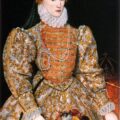
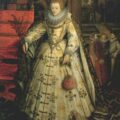
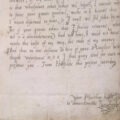


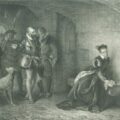
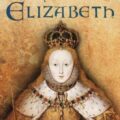
I think it’s very interested the way Elizabeth uses language to suit her purposes. She bends her gender all the time by referring to herself as a prince and drawing comparisons between herself and her father. She gives a sort of nod to her womanliness by referring to the “weakness” of her sex and then she goes on to imply that her royalty causes her to rise above the perceived ‘weakness’ of being female. When she wants to confuse the issue, her sentences become heavy and belabored. I think she also wants to create the illusion of superior knowledge and ability to use the language. Often, her courtiers weren’t quite sure what she had just said and for her formal addresses, she wrote and re-wrote many times untiil she was satisfied the desired response would be obtained. I am convinced she was a genius. I also have the book you mentioned and have not yet had a chance to delve into it but can’t wait to do so. I’m re-reading Anne Somerset’s bio and it’s quite good.
I always thought that Elizabeth used masculine terms to identify herself when she wanted to underline an association with her father, Henry VIII…”I am a lion’s cub,” for instance. She would avoid any reference to her mother, the Great Whore.
Jeane Westin
With regard to Anne Barnhill’s comment, “I think she [Elizabeth] also wants to create the illusion of superior knowledge and ability to use the language” — it wasn’t an illusion. Elizabeth not only received the kind of education usually only given to (male) heirs to the throne, but she was acknowledged as a true prodigy — brilliant, fluent in many languages, skilled in a dizzying array of arenas from academia and sports to arts and holistic remedies. Elizabeth used language skillfully — but it was not self-serving so much as designed to keep and strengthen her throne and, ultimately, to protect the best interests of her people. She lived in a highly chauvinist age where she had to know when to play “the woman card” and when to focus on the “divine right of kings” (to rule) — irrespective of gender.
I’ve just ordered this. Finally I’ll be able to read her letters and speeches as well as her poems and prayers in full. Have a bit of a wait for it though – it arrive until next month!